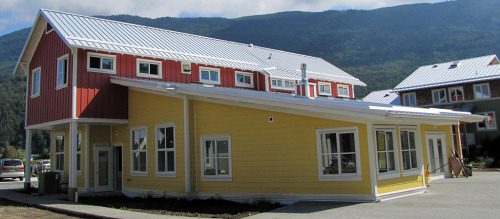Our Story
In 2002, a group of eco-visionaries from the Vancouver area, seeking a site for an ecovillage, combed the province and then found a suitable dis-used dairy farm in Yarrow, right here in the heart of Lower Mainland’s verdant backyard, the Fraser Valley.
The group purchased the 25 acre farm and created the Yarrow Ecovillage Society (YES) Cooperative… working cooperatively and focussing on sustainability in community life, agricultural practises, construction and economics.
Then the group made site and building plans to create a richly abundant, and well-connected ecovillage life, which included organic food production, creatively re-using and re-purposing buildings (residential and agricultural), a learning centre, an innovative waste water system, and preservation of historical buildings like the fine gambrel-roof barn. As well, YES soon purchased the Deli to employ ecovillagers, as well as local Yarrowites, and continue with a fine Yarrow tradition of providing friendly, local food shopping.
During the next several years, the ecovillage worked away behind the scenes and achieved ecovillage zoning status … which was no mean feat, as it was a ‘first’ in Canada. ( Thank you, City of Chilliwack!) This zoning allowed a comprehensive and integrated plan of denser housing, preservation of valuable farmland, and the historic barn within a commercially zoned portion. As well, the farmland, because it had been fallow for many years, was able to be quickly certified as organic (under BCARA?).
As it went along, the ecovillage adapted and evolved its plans to achieve as many of its goals as possible.
Although recycling old houses from off-site, turned out not to be possible, the building of new eco-friendly ones was. The first phase of construction ( 15 households in 7 buildings) put a sufficient number of residents in homes, so that they could settle and turn their energy towards completing the rest of the ecovillage.
Ecovillagers included some farm families, who concurrently with the residential building, were further developing the back 20 acres of ALR farmland into increasing scale and more effective vegetable production.
And also, a small group of our ecovillagers formed a separate cooperative to own and run the Deli.
In 2010, the ecovillage employed Charles Durrett and Katie McCamant, who helped us separate and define three interdependent but autonomous entities under the ecovillage ‘umbrella’ – farm, residential and commercial/mixed use. And at this time, we shifted the residential portion of our site plans to the cohousing model, called ourselves Groundswell Cohousing, with homes and common facilities owned under strata rules, and we made a priority of  completing the residential part of the ecovillage.
completing the residential part of the ecovillage.
 completing the residential part of the ecovillage.
completing the residential part of the ecovillage.During the next few years, we used a consensus-based community decision-making process to plan, design and implement the architectural site and building plans, that were rendered by Durrett, based both on our requests, and practical/economic realities. By summer 2012, we had completed our waste-water system with wetland marsh. And by summer 2014, the last phase homes were finished and a total of 31 households moved in. At the time of writing (spring 2015) the common house is nearing completion.
